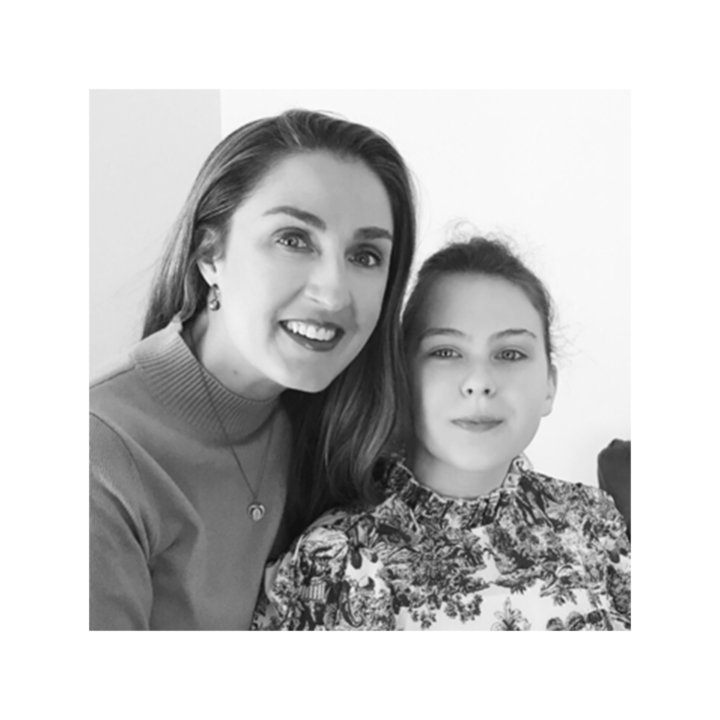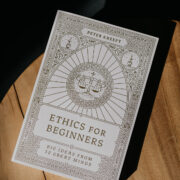Imagine, if you can, having a deep faith, a mind flooded with ideas, and a soul bursting with creativity, but you are locked in a “prison of silence,” unable to speak. That is Brielle Stewart’s world, and the world of many others like her who share a particular kind of autism called nonspeaking autism. I should say it was Brielle’s world until she learned to type her thoughts on a special communication board.
I had the pleasure of being introduced to Brielle and her mom, Tobi, shortly after beginning my Fellowship with the Word on Fire Institute. Theirs is an incredible story of love and determination that I wanted to share with you. It is a follow-up to my last piece that was published on May 19, which opened with a poem by another woman who also doesn’t speak.

It is easy for us to make assumptions about people we don’t understand—those who are disabled or simply seem different than the rest. Making assumptions, for most of us, is like a reflex—it is hard to overcome but essential if the Body of Christ is to be fully realized.
Our first thought when we encounter someone who can’t speak is typically that their inability to speak is associated with intellectual deficits or an internal emptiness. In our conversation, you will discover how far from true that can be.
Mark Bradford: Thank you both very much for your willingness to participate in this interview. Brielle, let’s start with introductions so our readers can get to know you. Would you please introduce yourself and your mom.
Brielle: I’m Brielle Stewart. I am a really stunning fifteen-year-old girl. I am Catholic, a composer, and I type to talk. My stunning mother is Tobi Stewart. Her love rescued me from a life of silence.
Mark: I had the pleasure of meeting you both a few months ago. I wanted to follow up with you to get your insight into some of the themes in a recent article I wrote for Word on Fire. Brielle, I was thinking of you as I wrote it because the poem I used to introduce the article was written by a woman who also has nonspeaking autism. You’re a beautiful poet, and you also write music. I’m curious about your reactions to the lines I quoted from her poem and the sentiment she captured in these words: sometimes flowing “between nonhuman animal tree.” That sentiment is incomprehensible to me. Can you help us understand what these words might be intended to convey?
Brielle: I understand this poet’s pain. I have felt invisible before. My family demanded I be respected. They educated me about my inherent worth as a child of God. To be a nonspeaker can be so lonely. Just as Mary and Joseph sought Jesus and found him in the temple, my parents had to find a way to reach me. They loved and respected me, no matter that I could not speak. It is a challenge to include the disabled for some. My parents insisted on it for me.
We can all strive to be better listeners to the love that needs no words.
Mark: Tobi, parents must be courageous and sometimes fierce advocates for their children who have disabilities. I’m sure you have had to face many challenges in medical care, education, etc., but I’m curious what your experience in the Church has been. Has acceptance of Brielle been easy or disappointing? What has the journey been like, and what advice would you offer to other parents who have children with disabilities?
Tobi: We began our journey toward the sacraments at the same time we began our journey to open communication on her letter board. I remember saying to Jesus, “I am walking her to you. Please guide me.” He sent me help in people with hearts of gold. I met the kindest faith formation director, who had a disabled sibling, and a retired monsignor, who never stopped encouraging me to come as a family to Mass. When Brielle received her First Holy Communion, she typed, “There is treasure hidden in the Eucharist.”
Families with a disabled or chronically ill member are often isolated and exhausted. Pray the Rosary. Our Lady will create a path forward to her son for you. She will never fail you. When we were met with people or things that were roadblocks, I trusted in the Blessed Mother. I received a call on February 14, 2021, that the bishop was coming to preside over Confirmation for our family’s group. I had joyful tears in my eyes as I told Brielle and her twin sister Kara that they would make their Confirmation together. Brielle typed, “Mom, Jesus just gave you the most loving Valentine’s Day gift!”
Mark: We share a faith in which we worship the second person of the Holy Trinity as the Word of God. We place a high value on speaking, and the Word is how God has communicated himself to us in the person of his son, Jesus. Please help us understand how we can come to know and love you when speech isn’t possible for you.
Brielle: I am a nonspeaker, but words flood my mind. Be loving and presume competence. Have more joy in your heart when you greet a disabled soul. I’m warmed by smiles, and I sense compassion. God himself is often silent. I think we can all strive to be better listeners to the love that needs no words.

Mark: Brielle, your mom told me that you refer to your peers who do not speak as your “silent ones” who are “trapped in prisons of silence.” None of us can have any idea of what it is like to be trapped in that prison. What can you tell us to help us understand, and how can we better welcome and embrace you and others with disabilities as our brothers and sisters in Christ.
Brielle: My mother looked in my eyes and saw Jesus in my suffering. I felt her love like healing water on the pain that was a fire of loneliness. I saw in her compassion and acceptance. I would encourage all people to see Christ in every human person.
Mark: Brielle, you have a deep faith and a thoughtful and artistic soul with many beautiful things to say. If you hadn’t found your voice, we would have no way of knowing these things about you. Tobi, can you describe a conversation with Brielle? And Brielle, can you contrast the before and after of discovering your communication board? What has been the greatest difference it has made in your life?
Brielle: My music and my thoughts were all trapped inside me. People all have a rich, inner world. I reveal myself in words. Access to communication is a human right. I believe that typing to talk will one day be as widely seen as sign language. If you research the histories of sign language and Braille, they were both initially met with resistance. My silent ones and I are building the bridges for the ones who come after us. We do not want anyone left alone in silent prisons.
Tobi: Before Brielle had access to communication we were always guessing when trying to meet her needs. A mother’s intuition is a powerful thing, but I wanted my daughter to be able to express her deepest thoughts and feelings. It took years for her to reach open communication with typing. Her language was intact but trapped inside her. With typing, we take communication out of the fine motor skills needed for speech and put them into the gross motor skill of pointing. Once this was mastered, the whole world opened for her. Brielle’s music teacher, recognizing her talents, made a special board for her with musical notation.
Mark: Tobi, we believe that God created each of us out of love as a unique and unrepeatable gift. The US Bishops have also said that “when persons with disabilities are embraced and welcomed and invited to participate fully in all aspects of parish community life, the Body of Christ is more complete.” As Brielle’s mom, what do you see as Brielle’s gift to the Body of Christ and how does she help complete the Body of Christ?
Tobi: My husband and I agree that being parents to Brielle and her sister Kara is the greatest gift of our lives. We all think we have so much to teach when we become parents. Then parenthood humbles us and shows us how much we have yet to learn. Jesus is undoubtedly with his most vulnerable. Through them, he teaches us the true nature of love.
I want to extend a deep and sincere thanks to Brielle and Tobi for sharing their thoughts and experiences with me. God calls all of us into a communion of love with him through his son, Jesus, and he asks us to share our gifts with one another to build up his Body, the Church. Brielle is a beautiful example of how one’s gifts can be hidden, unknown, and un-welcomed without the love and support of family and parish to encourage them. Theirs is an example of how much more beautiful the Body of Christ becomes when those once feared are welcomed to share the gifts God has bestowed upon them.
You can listen to Brielle’s Concerto No. 1 in D Dorian here and her song, “Silent Mermaid” here.
You can also visit the “Speaking is Overrated” blog where Brielle and her friends share their thoughts, poetry, and artwork.
